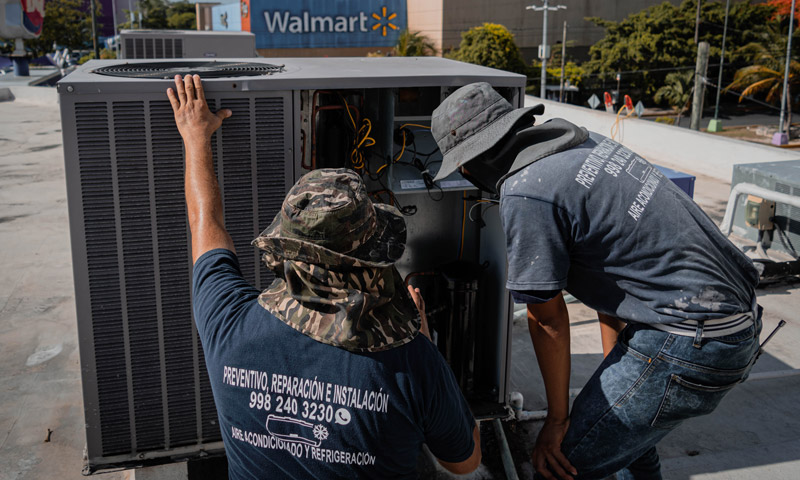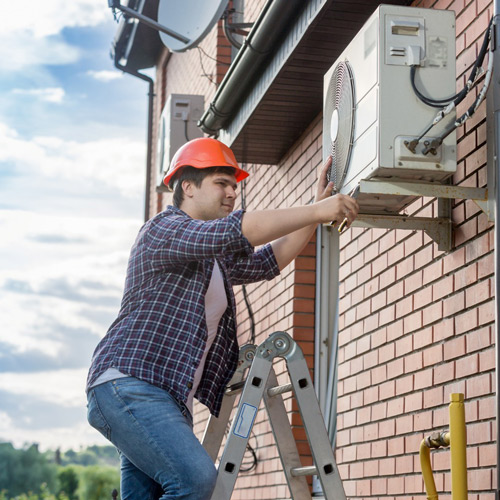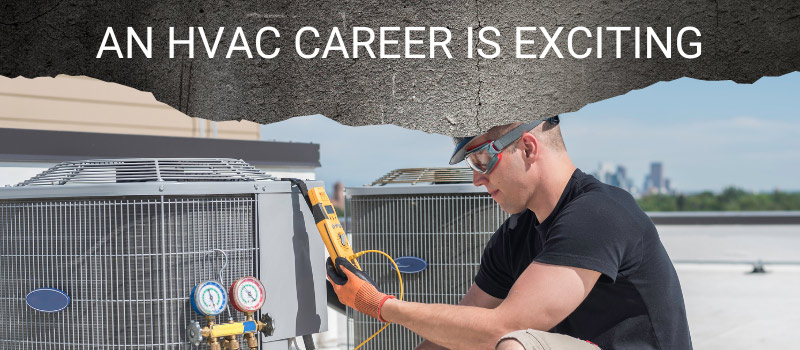Written by Industrial Stores Staff 02/03/23
HVAC technicians are extremely busy nowadays. New buildings are springing up everywhere, requiring technicians to install and maintain HVAC systems more often than ever before.
Energy usage standards are also changing, and there’s currently a rush to replace old systems to comply with current government standards.
That means there’s typically plenty of work for HVAC technicians; so much so that you should be able to find a job quickly, even if you had to change locations.
The earnings start trickling in early since you can start earning during your apprenticeship.
Today, you’ll learn why an HVAC career could be fulfilling for you. You’ll also discover:
Whether you’ve just graduated from high school, or you want to switch careers, HVAC is a career that will provide you with fulfillment for the following reasons.

A career in HVAC is one of the easiest to begin. Having a high school diploma and a positive work attitude is enough to start you off.
If you’re still in high school, it’s best to focus on math, physics, and computer skills. These subjects will aid your HVAC career in the following ways:
Make sure you complete basic electrical, electronics, and plumbing short courses. They can be highly relevant to your HVAC career.
However, if you don’t have a high school diploma, you can still take a test to obtain its equivalent—a General Educational Development (GED) credential.
A GED demonstrates that you have passed math, arts, social studies, and science. It proves you have attained the grade 12 equivalent in these courses, even without a high school diploma.
With either of the two qualifications in your hands, you can take the next steps to complete your training.
A certificate program is the fastest route to an HVAC career. It takes as little as nine months to complete and equips you with the skills necessary to find an entry-level job as a technician.
The program focuses on building your HVAC knowledge and skills. By the time you complete it, you’ll be able to:
If you want to increase your earning potential, you can enroll for additional courses from manufacturers or colleges, which will increase your capabilities.
You need certification to assure employers and clients that you’re skilled and professional when working on their HVAC units.
Some certifications, such as the North American Excellence (NATE) certificate, are optional. They prove you have a solid grasp of the HVAC fundamentals and advanced concepts.
However, some certificates are mandatory. EPA requires that Section 608 Technician certification be used in all states. This certificate allows you to work with refrigerants. It’s issued in three levels:
With any of these certificates, you’ll be ready to start your career in HVAC. You can then venture out and be interviewed for jobs.

As an HVAC technician, you can start earning a competitive wage early. It is estimated that apprentices start by earning half the wage of an experienced technician.
Your salary also increases at a higher rate than it would in other professions because of the increasing demand for HVAC technicians. According to the US Bureau Labor of Statistics (BLS), the highest paid 10% of HVAC techs earn over $78,210.
You can earn even more by working overtime. Other than the many jobs available, it’s easy to find extra repair and maintenance jobs since people's HVAC units are always on and don't only break down during work hours.
Gaining additional licenses is another way of increasing your earning potential. One example is a Professional Engineer License. It’s proof of a profession’s highest competence standards and has the potential to increase your salary by up to 59.97%.
The table below shows the various positions available as you seek to increase your earning potential.
If you want limitless earning potential in the HVAC industry, running a contracting business is a great idea.
You’ll require a contracting license after presenting documents that prove you meet EPA’s Section 608 certification requirements.
Next, find qualified technicians by interviewing them or getting recommendations from people you trust. Skilled technicians play a part in your business’s success.
Expect good earnings during the peak season of summer when customers are more likely to be in need of HVAC repair.
You can also partner with construction firms. They’ll give you contracts to install heating and air conditioning systems in residential and commercial buildings.

As an HVAC technician, there's a good chance of having a stable income from your regular job hours and when working overtime. Even if you move to a different location, you can easily find a job.
In fact, the employment of HVAC technicians is expected to grow by 5% (more than 38,500 additional jobs) between 2021 and 2031, as projected by the BLS. That’s as much as the growth of all the other occupations combined.
But why are the statistics in favor of an HVAC career? Why is their job security indicated?
There are two explanations for their job security:
Commercial and residential buildings are on the increase, with the global construction industry expected to increase by 4.2% between 2018 and 2023. This increase is due to a housing demand caused by urbanization and a growing population.
All these new buildings require the installation of various types of HVAC systems, and they provide a constant supply of jobs for HVAC technicians.
Gone are the days of simple air conditioners and heating systems. Today’s HVAC systems are designed with high-tech features that meet the need for energy-efficient models to counter energy wastage and air pollution.
The result is a high demand for replacing old systems with new ones to save money on energy consumption and constant repairs.
HVAC technicians, therefore, have their hands full. Their job security is guaranteed as long as the shift to modern HVAC systems continues.
With new buildings and complex HVAC systems coming up every day, it’s easy to see why HVAC technician jobs are guaranteed.

Yes. An HVAC career does have its downsides, which you should consider before signing up for training. They include:
Every job has its downsides, and an HVAC career is no different. As with any other job, you have to figure out a way of overcoming the difficulties you’re faced with.
For example, you can overcome the physical demands of the job by eating healthy food, getting enough rest, working out, and drinking enough water.
You can overcome hazards, such as electrocution and falls, by avoiding distractions when working and following the safety guidelines taught during your training.
If you’re interested in the HVAC career and are determined to succeed, nothing should stop you, not even the disadvantages.
Industrial Stores have a wide array of replacement parts and accessories to repair and maintain HVAC units.
An HVAC career is exciting, and we want to be with you every step of the journey as you search for quality parts.
If you’re just starting your career, we can save you time and money by helping you select the right parts for the job. You can return them if unsatisfied.
We also provide general product knowledge, like specifications, drawings, and literature, to better familiarize you with the products we offer.
“Lennox heat pump stopped working but the parts and instructions I bought from you guys were so easy to install.”
- Jack Lounsbury
We’ll be happy to serve you. Visit our store and see what HVAC and refrigeration brands will suit your needs.
Share on Facebook: